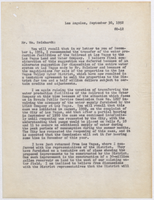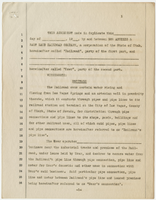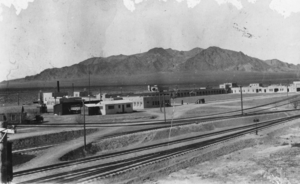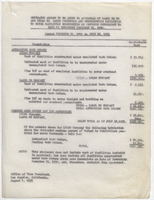Search the Special Collections and Archives Portal
Search Results
Marie Heher oral history interview
Identifier
Abstract
Oral history interview with Marie Heher conducted by her daughter Sharon Heher on March 01, 1977 for the Ralph Roske Oral History Project on Early Las Vegas. In the interview, Heher discusses her early life in Boulder City, Nevada and Henderson, Nevada, as well as her education in Reno, Nevada and Las Vegas, Nevada. Heher also discusses the Helldorado parades and her experiences with the Union Pacific Train Depot in downtown Las Vegas, Nevada.
Archival Collection
Union Pacific Railroad Photographs
Identifier
Abstract
The Union Pacific Railroad Photographs depict the Union Pacific Railroad Company's tracks, depots, locomotives, and stations in Southern Nevada and Southern California from 1904 to 1973. The photographs primarily depict Union Pacific officials in Las Vegas, Nevada, construction of Boulder City, Nevada and the Hoover (Boulder) Dam, hotels and casinos in Las Vegas, and the aftermath of flooding in 1938 that damaged Union Pacific tracks.
Archival Collection

Letter from E. E. Bennett (Los Angeles) to William Reinhardt, September 30, 1952
Date
Archival Collection
Description
The ability of the railroad to resist demands to increase water production would be aided if water production facilities were solely in the possession of the Las Vegas Land and Water Company
Text
Robert M. Tubb oral history interview
Identifier
Abstract
Oral history interview with Robert M. Tubb conducted by Robert B. Grzywacz on March 01, 1975 for the Ralph Roske Oral History Project on Early Las Vegas. In this interview, Tubb discusses moving to Nevada in 1907. He describes his early life and his father's career on the railroad, as well as the time he spent living in Ash Meadows Spring, Nevada and Death Valley. Tubb also goes into detail about his education and the growth of Las Vegas, Nevada.
Archival Collection
Guy Hamblin oral history interview
Identifier
Abstract
Oral history interview with Guy Hamblin conducted by Barry Merrell on February 22, 1975 for the Ralph Roske Oral History Project on Early Las Vegas. Hamblin discusses moving from different towns in Nevada before settling down in Southern Nevada, viewing the above-ground atomic bomb tests, early Fremont Street, and his work on the railroad. Hamblin also discusses the demographic and economic changes that he has seen in Las Vegas, Nevada.
Archival Collection

Blank contract between the Los Angeles & Salt Lake Railroad and industrial users, June 1922
Date
Archival Collection
Description
Blank contract between the Los Angeles & Salt Lake Railroad and industrial users
Text
Fred O. Wharton oral history interview
Identifier
Abstract
Oral history interview with Fred O. Wharton conducted by William B. Stabler on March 10, 1976 for the Ralph Roske Oral History Project on Early Las Vegas. Wharton describes the United States Air Force base in Tonopah, Nevada that was used to train B-29 bomber pilots during World War II. He also describes mining in Tonopah and in the greater Nye County, Nevada area, including what kinds of metals they mined and the processes used to extract them. Lastly, Wharton discusses the history of the railroads in Nye County, living in rural Nevada, and how Tonopah has changed.
Archival Collection

View of Death Valley Junction, California: photographic print
Date
Archival Collection
Description
From the Nye County, Nevada Photograph Collection (PH-00221) -- Series VII. Other areas in Nye County -- Subseries VII.F. Lowe Family. Shortly after the hotel was constructed, the Pacific Coast Borax Company constructed a swimming pool and planted a number of trees in the square. The building at the left end of the square is the company store. An infirmary was established at the right end of the square. Uppermost track going off to the left toward the middle of the photo is the narrow gauge to Ryan. Funeral Mountains are in the background.
Image

Report on costs of reproduction at various water production properties owned by Los Angeles & Salt Lake Railroad Company, August 1, 1951
Date
Archival Collection
Description
Estimated amount to be added to appraisal of Los Angeles & Salt Lake Railroad Company and Las Vegas Land and Water Company water producing and distribution facilities to cover facilities constructed or proposed subsequent to date of inventory December 31, 1950. Estimated cost of reproduction new and less depreciation of water production and transmission facilities. Itemized list of improvements made by the water company subsequent to the previous inventory.
Text
Roy Waite oral history interview
Identifier
Abstract
Oral history interview with Roy Waite conducted by Dale Haley in approximately 1974 for the Ralph Roske Oral History Project on Early Las Vegas. Waite begins by discussing his athleticism, being a part of the first basketball team in Las Vegas, Nevada, and his general store in Bunkerville, Nevada. Waite lists the different social organizations and boards he was affiliated with, describes the arrival of the railroads, and the ranch he used to own near Bunkerville. He talks about the construction of Hoover Dam (Boulder Dam) and how Southern Nevada has changed socially and environmentally. Waite also discusses smelting lead for bullets and relocating Native American remains away from a grave site that would be submerged by Lake Mead.
Archival Collection
